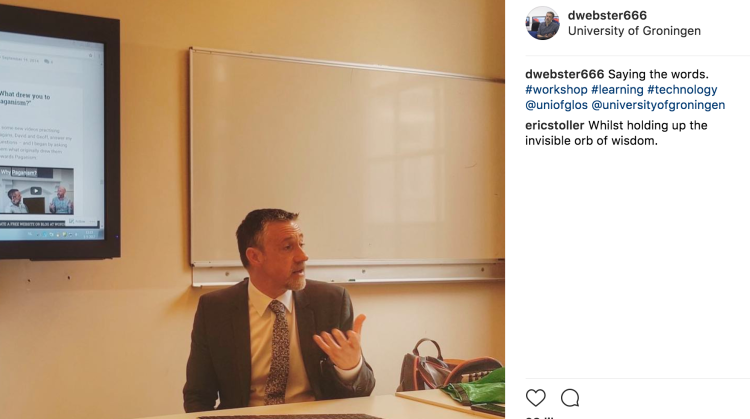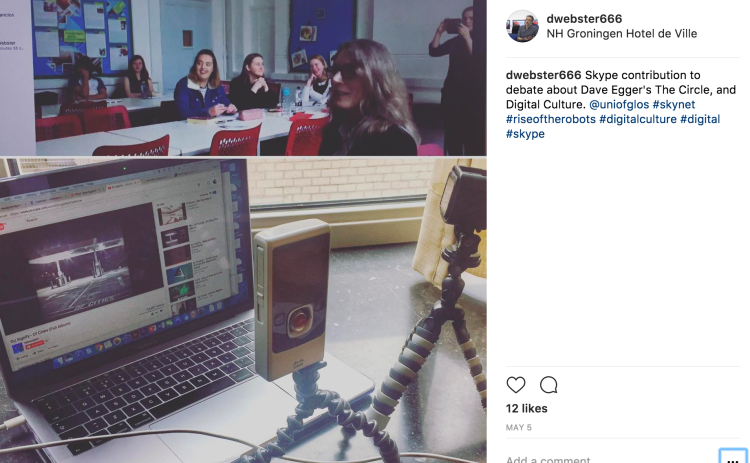I can’t seem to get used to it. No matter how many times I sit on the train North from Amsterdam, towards Groningen, the flatness of the landscape shocks me. The undulating Cotswolds are hardly mountainous, but by contrast seem an epic landscape.
My first ever trip here, oddly enough, was about climbing something, but I have already written about that. This trip was about something I hoped to be more in line with the landscape. That is, I was here to teach. I was here as part of the University of Gloucestershire Erasmus link with the University of Groningen. And my aspiration was that there would less vertical authority in my sessions, and a more horizontal sense of shared endeavour.
I had a number of things planned. As well as teaching on classes in Philosophy of Religion (with the excellent Prof. Christoph Jedan), and a session on Sacred Space (with the awesome scholar Dr Stefania Travagnin), I had some other plans. One thing about contemporary travelling, that I secretly rather like, is that I don’t get to postpone the class I am missing back home. So, for my usual hm6502 Emergent Spiritualities class, there was something extra, rather than a cancellation. As per the image here, I was able to offer the session to students in Groningen too, and we used Adobe Connect to connect to the classroom I usually teach in, back in Cheltenham. The link worked. The technology is the easy bit – and we were able to have questions from both sets of students, and I felt it went well. A topic like Occulture, with issues related to fandom, religious practice, parody, postmodernism and faith is hard for even me to make dull, and as often happens in a successful session, the technology and distance soon fades the topic engages us all.

I also snuck in a workshop on Technology-Enhanced Learning (TEL), where I focussed on some of the work we have done with cheap technology, and our findings in relation to student learning. I talked a bit about the philosvids site, and social media, but more about how you plan and integrate TEL into a face-to-face course, and we had a lot of conversation about how you begin to move in this direction, in ways that ensure staff and students both stay on-board, and also reap benefits.
I also forgot I had said ‘yes’ to something. Whoops. Last year, I had a discussion with a colleague, Dr Hilary Weeks, about the Dave Eggers book The Circle. She and her students saw in it a stark warning about social media and what is was/is doing to ‘us’. I expressed that, while I had enjoyed the book, and found it a ‘page-turner’, I was sceptical of those lauding it as prescient, or profound, in relation to Social Media. As I have been keen to the vaunt the benefits of two things recently, I thought there was a chance here to do something interesting. The two things are (1) Teaching students that academics don’t know everything/agree – that there are unsettled matters in the world, between scholars – and that students are probably less conceptually distant from their tutors in this respect than they imagine, in this respect. And (2) if we want students to know how to disagree, how to argue constructively, we can’t just tell them – we have to show them. We have to model the behaviours we aspire for them to emulate, or display. So, Hilary and I decided we would disagree in front of the students. They were going to read the book as part of one of her modules, and the seminar could be a debate between her and me, and the students could do a Q&A, and then have a vote. Or something. Sure. Let’s do that. I then put it out if my mind, till my colleague sent me the date (that I had apparently* agreed). Oh dear. I would be in Holland that week. Actually, not ‘oh dear’, because this meant we could try something else too. So, confined to my room by torrential rain (and a nasty cough that I didn’t feel I should share with the locals), I Skyped into class. And we had the debate. Unlike debates in RPE, where I always win, and always play dirty, this was more reasoned, and although I didn’t get all the class on my side – there were a few who moved towards my (obviously correct view).

The point of this post was to give me space to reflect on the teaching trip, and what I learnt from it. I always learn from students anyway – and the class sessions left me with lots anyway, but the messing with technology, and the ease with which the sessions just worked** as teaching/learning events, made me think about why. I think I might have an inkling. For both the Circle debate, and the hm6502 lecture, both were sessions about the content first. Technology helped me solve a problem, and no doubt the solution shaped the way I delivered, and some of what I left in, added, or took out, as opposed to a face-to-face version, but the conception of each session was about the learning – and the technology was selected to fit with the actual learning goals. That might sound obvious – but I wonder if others are as guilty as I have been in the past, of allowing my ‘oooh, look at that – I want to play with that tool in class’ to get the better of me, and shoehorning some tech into sessions, with no real learning benefit, just a bit of novelty (or annoyance if it doesn’t work). In the future, learning first, fun toys after.
—————————————
*Almost definitely.
**I have done many things, some with technology, in the past, that have worked, shall we say, less well. I might even write about those one day.***
***No promises on that one.


Dave, speaking of modelling behaviour, you show that candour leads to enlightenment. I’ve always favoured sprezzatura in the face of forgotten engagements. The Circle session in HM4304 was great fun, though. Thanks again. Greetings from Bavaria, by the way, where I am pursuing all sorts of learning and teaching ideas. Prost!
LikeLike